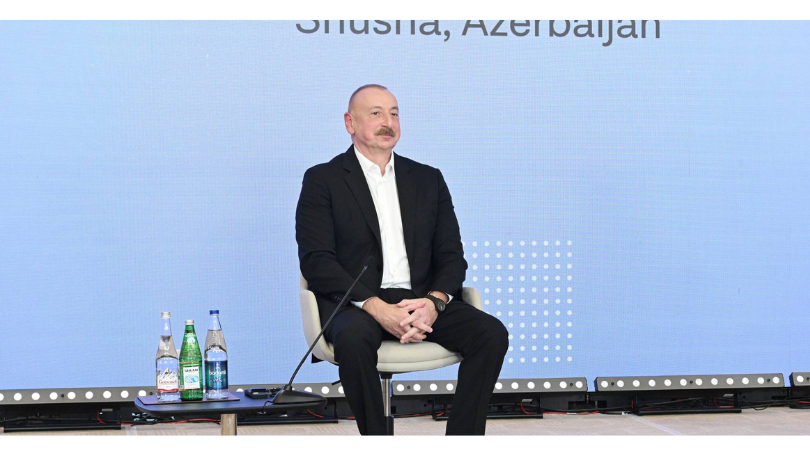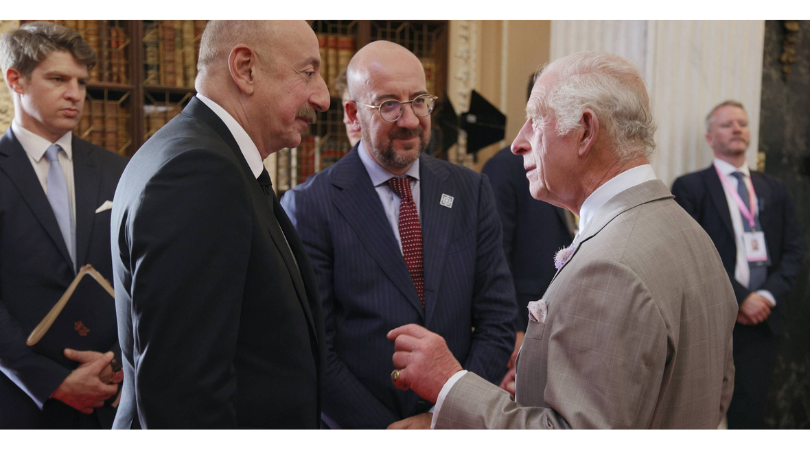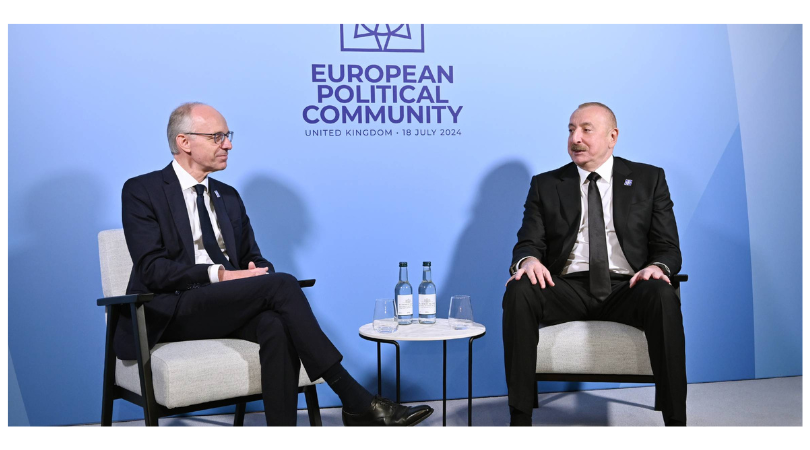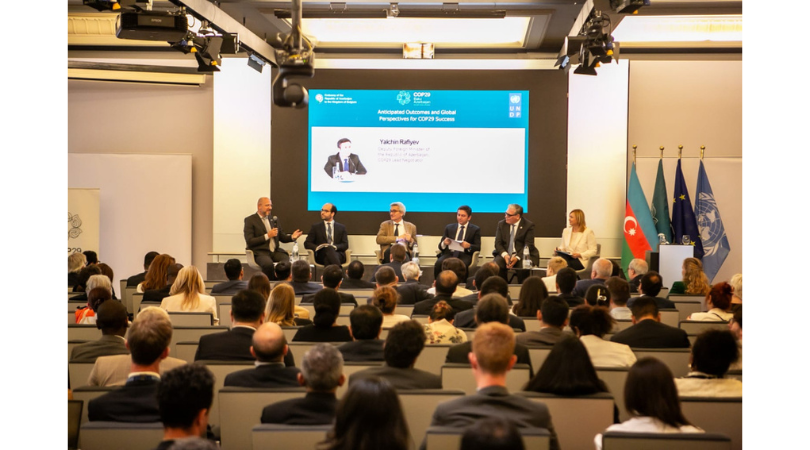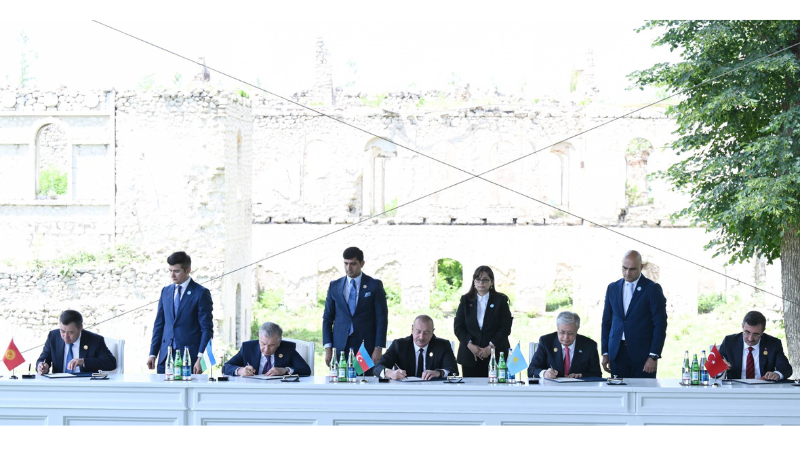Ilham Aliyev attended the opening of the IX Global Baku Forum
Organized by the Nizami Ganjavi International Center under the patronage of President Ilham Aliyev, the 9th Global Baku Forum under the motto "Challenges to the Global World Order” has today kicked off.
President of the Republic of Azerbaijan Ilham Aliyev attended the opening ceremony of the Forum.
First a photo was taken.
Opening the 9th Global Baku Forum, the co-chair of the Nizami Ganjavi International Center Ismail Serageldin said:
-Your Excellency, President Ilham Aliyev,
Excellencies,
Ladies and gentlemen.
My name is Ismail Serageldin and I am a co-chair of the Board of Trustees of the Nizami Ganjavi International Center. We are very honored to welcome you to this opening session of the 9th Global Baku Forum. It is my great privilege in this initial session to ask His Excellency President Ilham Aliyev, President of the Republic of Azerbaijan, to take the floor for opening a key note address to this ninth Global Baku Forum and with that the forum will be started. Your Excellency.
XXX
The head of state made a speech at the opening ceremony.
Speech of President Ilham Aliyev
Thank you very much. Good morning. Dear friends, ladies and gentlemen,
Dear presidents,
Dear co-chairs of Nizami Ganjavi International Center.
I welcome you all and wish to express gratitude for being with us today. The 9th Global Baku Forum opens today and I am sure that the discussions as always will be very productive, because we have a great audience. Members of the Nizami Ganjavi International Center and the guests participating in the forum I am sure will contribute to very open and sincere discussion on the most urgent issues on global arena. And I am sure that discussions and also exchange of views will help to elaborate new approaches towards the resolution of the issues which are on the top of global agenda. During its activity the Nizami Ganjavi International Center transformed into one of the leading international institutions addressing global issues and managing to embrace broad international community. We met yesterday with the members of Board and I was informed that at the 9th forum we have high-level representatives from almost 50 countries. This is much more than a year ago. So, this demonstrates the attractiveness of our discussions. This demonstrates that this platform is needed and it’s very useful. It has a very important practical impact and I am sure what will be discussed these days in Baku and also in Shusha on Sunday will be important for decision-makers. Because elaboration of new approaches is needed today maybe as never before. I’d like to express gratitude to the co-chairs of NGIC Madame Vike-Freiberga and Mr. Serageldin for their outstanding contribution to the transformation of the Center and the Global Forum which I think now in the top list of international fora. Also I would like to express gratitude to all members of Board for their active role in this transformation. When I talk about new approaches, it’s clear that the world has changed since we met last November here in Gulustan Palace. The change is fundamental. We have so far unpredictable consequences, but it’s clear that the world will be different, and it is already different. Therefore discussions, exchange of views, sometimes contradictions of different opinions, that’s what is needed in order to elaborate new approaches. Every country, of course, should contribute to that, first of all, with respect to security measures, because issues of security now become the top issue on international agenda. At the same time, I’m sure that open discussions about the current situation in Europe is needed. The Global Baku Forum is an excellent platform for that. It’s an inclusive forum which accumulates opinions from different sides and I think that’s how it should be. Because we all need to work closely in order to make the world safer and more secure. At the same time, also I am sure that one of the issues on the agenda is what will be the role of leading international institutions, what will be the role of leading financial institutions in coping with food crisis, because it is inevitable and it is already next door and international organizations and leading countries also should take care of situation with potential growth of migrants which will be a consequence of food crisis. If we add here the situation on the energy markets which is a very unpredictable and which also leads to disparity between producers and consumers and this is a risk also for producers. If somebody thinks that countries-producers of oil and gas are very happy with these high prices, it’s a wrong assessment. The balance of interest between producers, consumers stable market, that’s what producers really need and the efforts of OPEC plus where Azerbaijan actively participates were aimed at that.
So, all these are new challenges. What I am saying now is absolutely different from what I was saying six months ago sitting on this place. It shows that everything can change, everything changes and nothing is stable. Of course, as President of Azerbaijan I work on the issues related to security of our country and resolution of the Karabakh conflict, I think, is an opportunity for security in the region, for peace in the region. Last time when we met I broadly covered the issue related to occupation, devastation and humanitarian crisis which our people suffered for almost 30 years. I don’t want to repeat that. It is known already, because there are so many visitors to the liberated territories-politicians, public figures, journalists, representatives of civil society and they see all with their own eyes what ruins were left after Armenian occupation. I am grateful to Nizami Ganjavi International Center that last year they organized one session in Shusha and we had an opportunity to meet there. I was actually working as kind of a guide to our guests showing them the situation. Therefore, I want to express our approaches to post-war situation, to situation related to post-war security in the Caucasus. Azerbaijan won the war. The war was just, the war was inevitable and it led to restoration of justice, international law, and national dignity of Azerbaijani people. Now we talk about peace. I think it’s one of the unique cases in the world that after such a long-lasting confrontation within a short period of time the country which restored justice and defeated aggressor offers peace. If you look at the history of wars not in many cases one can see this picture. But why we select peace, because we want stable, sustainable development in the Southern Caucasus. It’s a unique opportunity. Southern Caucasus was disintegrated throughout the years of independence of three countries of Southern Caucasus. For thirty years it was disintegrated because of Armenian occupation. So, now it’s time to establish peace, establish cooperation. And Azerbaijan is working on that. With respect to process of normalization of relations with Armenia, we suggested, it was our proposal to start working on peace agreement. Armenia did not respond. Then we made another step, we put forward five basic principles of international law, including mutual respect to and recognition of territorial integrity of both countries and mutual refrain from any territorial claims now and in the future, and other principles which make the bulk of our proposal. We were glad to see that the Armenian government accepted this five principles. So this is positive dynamics but now we need to move to practical implementation. Because we know from the history of times of occupation when we were negotiating that sometimes words even on high-level articulated by Armenian officials do not mean a lot. Because we need steps. Azerbaijan already on its side established Azerbaijani commission on peace agreement and we expect the same to be done by Armenia. As soon as it is done, or if it is done, then negotiations will start. We also put forward a proposal to start the process of delimitation of our border. Because biggest part of our border was also under occupation and never a delimitation took place. Therefore, this process also have started and the first joint meeting of the border commissions of Azerbaijan and Armenia took place last month on the border. That was also symbolic that both sides met on the border and that was also an important message that there will be progress. Of course, we understand that it’s a long way but it started. At the same time, we expect that Armenia will comply with the trilateral Declaration signed on 10 November 2020 with respect to the opening of communications for Azerbaijan to have connection with its Autonomous Republic of Nakhchivan. Unfortunately, it’s more than one and a half year since Armenia signed a capitulation act, but so far there is no access. And this is unacceptable. First, this is a violation by Armenia of the provisions of trilateral Declaration, and it also creates a kind of imbalance in the region, because based on the same declaration, Azerbaijan undertook obligation to provide unimpeded access from Armenia to Karabakh region of Azerbaijan where Armenian population lives. So for one year and a half Armenians are using Lachin road to have this unimpeded connection, but Azerbaijanis cannot use the road through Armenia-Zangazur corridor to connect us with Nakhchivan. This is not fair and this is not just. We will never agree with that. Therefore I think that the deliberate delays from Armenian side of giving us this access is counterproductive. It reminds me of the times of negotiations when Armenia was delaying and delaying and just winning time. What was the result of that? The result was total defeat on the battlefield and on political arena. The result was that Armenian ideological basis was totally dismantled. Almost 30 years of occupation did not make Armenian people happier. On the contrary they have been known by the world community as occupants and aggressors. Now, after the war ended everybody can see what ruins they left during the times of occupation. Therefore the soonest resolution of the opening of Zangazur corridor is one of the fundamental elements of future peace in the region. If we are not given this access then it will be difficult to talk about peace and all efforts of Azerbaijan aimed at normal coexistence and normal neighborhood with Armenia will fail. This is an important issue again. Azerbaijan has a right to demand it. Armenian government signed a corresponding declaration. Second, Azerbaijan won the war as a country which suffered from occupation, and we have a moral right to demand it. Another issue which I want to draw your attention is issues related to Armenians who live in Azerbaijan. I think that the declaration which was announced by President of the European Council Mr. Charles Michel as a result of a trilateral meeting in Brussels between President Michel, myself and Prime Minister Pashinyan clearly says that rights and security of Armenian population in Karabakh also will be taken into account. We fully support it. Rights of security of all people of Azerbaijan are provided by our Constitution. Azerbaijan is a multiethnic country and the Armenian population is not the biggest ethnic minority in Azerbaijan. Therefore our Constitution provides equal rights for representatives of all ethnicities, including Armenians who live in Azerbaijan for many years. Therefore-rights and security-we will, of course, take care of that. But unfortunately, we start to hear from Armenian government words about status of the so-called “Nagorno-Karabakh” which is absolutely counterproductive and dangerous for Armenia itself, because Nagorno-Karabakh does not exist. The Nagorno-Karabakh Autonomous District was abolished in the end of 1991 by the decision of Azerbaijani Parliament. We don’t have this administrative structure on our territory. Therefore any kind of reference to the so-called “status” will lead only to a new confrontation. Armenian government should understand it and should refrain from attempts to re-write history. History is already here. It was kind of a verbal agreement that no one will talk about the status. Unfortunately, it happens and it can lead to very serious consequences, because if Armenia continues to put under question Azerbaijan’s territorial integrity then Azerbaijan will have no other choice but also put under question Armenian territorial integrity. And from historical point of view, we have much more rights to do it. Because the history of the last century clearly shows that in 1920 in November six months after sovietization of Azerbaijan, the Soviet government took historical part of Azerbaijan Zangazur and adjusted it to Armenia. Therefore, if Armenia will demand status for Armenians in Karabakh, why shouldn’t Azerbaijanis demand status for Azerbaijanis in Western Zangazur? Because it was fully inhabited by Azerbaijanis. So, this way will lead to a deadlock and I think Armenian government should not forget the lessons of the second Karabakh war and learn that lesson well and refrain from any kind of territorial claims to Azerbaijan.
Another issue, which I also want you to know, is also speculations about the activity of the Minsk Group. Minsk Group was created in 1992. The mandate was to help to resolve the conflict, but de-facto activity led to zero result. Can you imagine? For 28 years a group which has a mandate from OSCE didn’t produce any result and therefore, after Azerbaijan resolved the Karabakh conflict, the need for Minsk Group activity is no longer here. And we think that everybody understands it. Especially, after Russian-Ukrainian war, it is clear that three co-chairs of the Minsk Group cannot get together and we already received these messages that the Minsk Group will not, I mean the co-chair institute of this group will not function. In other words, Minsk Group is dysfunctional. Therefore, the attempts of revival are also counter-productive. I think the best way is to say goodbye to Minsk Group, not thank you and goodbye, but only goodbye, because 30 years is enough. It is time for retirement. So, I also want to express our position that any kind of speculations in Armenia or in any other country about Minsk Group lead only to irritation in Azerbaijan. We resolved the conflict. The so-called Madrid principles, which were elaborated by the Minsk Group, have been resolved and now we need to think about how to normalize relations with Armenia and sign a peace agreement. I think we can, if both sides work in good faith, sign this peace agreement within one year. And then, the peace will come to Caucasus and our vision for Caucasus is integration. Cooperation and integration. And Azerbaijan already made on several occasions proposals to start, to make a first step. We consulted this issue with our Georgian colleagues and Georgian government is also supportive to this idea to organize a trilateral meeting on the level of foreign ministers of Azerbaijan, Georgia and Armenia in Georgia and to start this dialogue. Unfortunately, Armenia refuses. I don’t know what is the reason for that. I cannot find any explanation, any reasonable explanation. The same attempts were made, as far as I know, by some European institutions. Again, there was a refusal. If Armenia does not want to have peace in the Southern Caucasus, then there is a question, what do they want? If they want another war, it will be a catastrophe for them and they clearly understand it and I think that the government and the revanchist forces in Armenia clearly understand that will be the end of their statehood. Therefore, I think we need to get a clear answer from Armenia. How do they see the Southern Caucasus? Our position is clear. The position of Georgian government is clear. We want to start this dialogue, start this interaction and, of course, without Armenia it will not be possible.
Specially taking into account the current situation, there is a need, also, to address issues of regional importance related to ecological protection, trans-boundary rivers, which create a lot of pollution to Azerbaijan, issues related to transportation, new opportunities with respect to transit, especially taking into account that Azerbaijan is now coming closer to completion of its portion of the Zangazur corridor. The new routes, energy security can also be part of that. So, I think it is time to start, because we lost 30 years and if not for Armenian occupation, I think the Southern Caucasus today would have been a very dynamic and modern region with bigger economic potential.
And a couple of words about energy security, because it is one of the urgent issues on global agenda. Demand for Azerbaijani energy resources is growing. This February, here in this Gulustan Palace we held the annual meeting of the Southern Gas Corridor Advisory Council and it was February 4. We were just planning our future steps, but the situation in Europe has changed dramatically. Therefore, the need for Azerbaijani hydrocarbons is growing and we are trying to do all what we can in order to satisfy the growing demands from many countries. We received, during the last couple of months, requests from many European countries with respect to the gas supply and, of course, it is not easy, because first we need to produce it and we were not planning to increase gas production. Therefore, now we are working with the European Commission on this issue. We started energy dialogue with the European Commission, which covers not only gas, but also oil, electricity and hydrogen. There is great potential in Azerbaijan in renewables. We discussed it yesterday broadly with the members of the Board and we already started. We are planning to continue these efforts and already more than 700 megawatts of wind and solar generation will be in operation within a year and a half. But this is only the beginning. The potential is much greater. Already we signed preliminary agreements with respect to 4 gigawatts of renewable energy and only the potential of the Caspian Sea is 157 gigawatts. So it is a huge amount. Azerbaijan definitely without any doubt will transform into a green energy zone, will transform into a serious player on international energy markets with respect to renewables.
I don’t want to take much of your time. I want to conclude my comments, saying once again welcome and thank you for being with us and wish the Forum success. I am sure that will be the case, as usual. Thank you.
X X X
Then, the former President of Latvia, the co-chair of the Nizami Ganjavi International Center, Vaira Vike-Freiberga, spoke about the current geopolitical situation in the world and stressed the necessity of uniting efforts globally to eliminate conflicts and prevent wars.
Sharing her views on security, the new world order and ways of achieving peace, Vaira Vike-Freiberga said: "We were warmly welcomed by the President of the country, who is the host of the IX Global Baku Forum. We would like to thank Mr. President for his time to address this audience and clarification of the important historical events from the moment Azerbaijan managed to liberate its territories to the present day. The hope he gives to the people who lost their homes, territories and native lands is, of course, encouraging."
The former President of Latvia said that the steps taken in the direction of securing peace between Azerbaijan and Armenia are commendable. Highly appreciating the efforts of the European Union in this regard, Vaira Vike-Freiberga said: "As President Aliyev stressed, the good will to take part in the negotiations, the good will of his country, I think, is an example of what is needed to make progress. "
Positively assessing Azerbaijan's approach to the resolution of conflicts globally, Vaira Vike-Freiberga said: "I think that the key points we heard from President Aliyev defines the way we look at the crises we have."
Saying that wars and threats create a number of problems globally, Vaira Vike-Freiberga highly appreciated the work of the Forum in terms of finding solutions to conflicts.
Sharing the views of the former President of Latvia, the co-chair of the Nizami Ganjavi International Center, Ismail Serageldin, thanked for the conditions created for them and said:
“Taking this opportunity, I would like to thank President Aliyev for creating the space of freedom that he has provided for us over the years both in the global Baku forum and in other meetings of the Nizami Ganjavi center. We are under his auspices. We have always felt free to explore, to listen to the diversity of views and to hopefully come up with sound ideas from people of experience and good will.”
The President of Albania, Ilir Meta, stressed the necessity of strengthening the role of the United Nations in the fair resolution of problems on the international level. He called on the world powers to increase their international efforts in order to prevent wars. Thanking the government of Azerbaijan for the conditions created for such discussions, President Ilir Meta said:
“I take the opportunity to express once again my gratitude for the support provided by Azerbaijan and President Aliyev for the successful implementation of Trans-Adriatic Pipeline and Ionian-Adriatic Pipelines in Albania and in our region.”
Stressing the necessity of joining forces in fighting the pandemic, strengthening global integration and expanding cooperation, Ilir Meta again thanked the organizers of this important event in Baku.
Then, the chairman of the Presidency of Bosnia and Herzegovina, Šefik Džaferović, said during his speech:
“Dear President Aliyev, I wish you success in the efforts of restoration of Karabakh. I wish you success in the full implementation of the agreements you achieved following the second Karabakh war and the protection of Azerbaijan’s territorial integrity within the framework of international law”.
Šefik Džaferović underlined the importance of cementing international cooperation to make sure that our future world is without conflicts and safe. With specific facts, he stressed the necessity of conducting reforms in the UN.
Speaking afterwards, the President of Georgia Salome Zurabishvili shared her views on peace, security, fundamental human rights and shortage of food and energy. Stressing that establishing peace in the South Caucasus is one of the key issues nowadays, she said:
“I welcome the participation of the European Union in the peace talks and the confidence building process between Azerbaijan and Armenia”.
The Director-General of the World Health Organization (WHO), Tedros Adhanom Ghebreyesus, also expressed satisfaction with his participation in the discussions. Tedros Adhanom Ghebreyesus said that although a lot of work had been done in the world to ensure vaccination, it was not enough yet. Stressing the necessity of fundamentally improving the international healthcare system, he said:
“As the WHO, we should highly appreciate the efforts of Azerbaijan in fighting the pandemic. I am very happy to see that the infection and mortality rates in Azerbaijan are at the lowest level since the onset of the pandemic”.
The Director-General of the WHO stressed that the heavy consequences of wars adversely affect the world healthcare system, as well, and added that specific actions should be taken in this regard.
The former Prime Minister of Turkey, Binali Yildirim, said the following:
“Dear chairman, at the beginning of my speech, I would like to express my gratitude to His Excellency President Ilham Aliyev for the high level of hospitality towards us. I would like to say that I am pleased to take part in this Forum, which the Nizami Ganjavi International Center has already turned into a tradition, and I would like to thank distinguished Ismail Serageldin and Vaira Vike-Freiberga for the invitation to participate in this event”.
Binali Yildirim brought to the attention of the participants with concrete facts that consecutive and systemic work had been carried out in Turkey in order to restore international justice. Emphasizing that the South Caucasus should turn into an arena of peace, friendship and cooperation, he said:
“There are many examples of that. As His Excellency President Ilham Aliyev put it, no result had been achieved in the resolution of the Karabakh conflict over 26 years despite the attempts made by the UN, the OSCE Minsk Group and other international organizations. However, Azerbaijan liberated its occupied territories with its own resources and power following the 44-day Patriotic War”.
The Director-General of the United Nations at Geneva, Tatiana Valovaya, thanked the Nizami Ganjavi International Center for approaching the discussion of issues concerning the world with special sensitivity and President Ilham Aliyev for creating the conditions for discussing such issues as climate change, food safety and others. She said:
“I would like to express my deep appreciation to His Excellency President Aliyev for the warm welcome and hospitality and the Nizami Ganjavi International Center for the organization of the IX Global Baku Forum. I am also happy to visit Baku again, which I visited many times before and which has ancient history besides being a modern city. I am looking forward to seeing the change here again.”
Saying that the pandemic has more distinctly revealed the social injustice across the world and the international community must intensify efforts to cope with this problem successfully, Tatiana Valovaya spoke about the work done in order to carry out the responsibilities of the UN in this direction. She said that there is much more to be done to eliminate the consequences of COVID-19 on our planet.
The eighth Secretary-General of the Arab League, the former Foreign Minister of Egypt, Ahmed Aboul Gheit, said that the topic of the Forum is important for discussion. He thanked the President of Azerbaijan for the continuous support for the Global Baku Forum and the hospitality and said:
“Let me, first of all, briefly address President Ilham Aliyev, Mr. President, it is the first time I have participated in the Baku Forum. I have been to this city three times as foreign minister. Last, I was here in 2009. But, I have to tell you, Mr. President, how much I have been admired by the development of the city. You have turned it into a big and modern city and I welcome your achievements”.
The former foreign minister of Egypt stressed the importance of taking required steps to achieve peace and build a safer world amid crises and uncertainties in the world.
Speaking at the end, the co-chair of the Nizami Ganjavi International Center, Ismail Serageldin, wished the Forum success and said:
“Mr. President, we should have the courage to dream and we should believe in the power of our dreams, but we need to take root in the realities of the present day and the future. We should make sure that we can move from conflict to peace, from fear to safety and from national security to human security at a time when all of us go forward in order to live in a greater diversification”.
“Mr. President, you have given us this space and freedom at the Global Baku Forum and we are looking forward to having discussions on diversification by trying to be worth of the wisdom of our ancestors and probably making contributions to the generations that will come after us. Bu saying so, Mr. President, I we would like to thank you for allocating so much time for us and declare the Global Baku Forum officially open. We hope to be together with you and report to you at the end of the Forum. Thank you. I declare the session closed”.
X X X
The Forum continued with panel sessions.
X X X
The Nizami Ganjavi International Center has become a significant international center, which explores ways of solution to global problems and informs the world community. It is because of this fact that interest in the events organized by the Center increases from year to year.
Representatives of more than 50 countries and reputable international organizations are taking part in the Global Baku Forum, which is this time devoted to the topic, Challenges to the Global World Order. The Forum, which lasts till 18 June, will see productive discussions on such important topics as key problems threatening the world order, including the prospects of ensuring peace and security in the world, ways of resolution of threats to energy security, peace, cooperation and integration in sensitive regions, growing injustices in the globalized world and transformation of food and agriculture sectors to prevent poverty.

